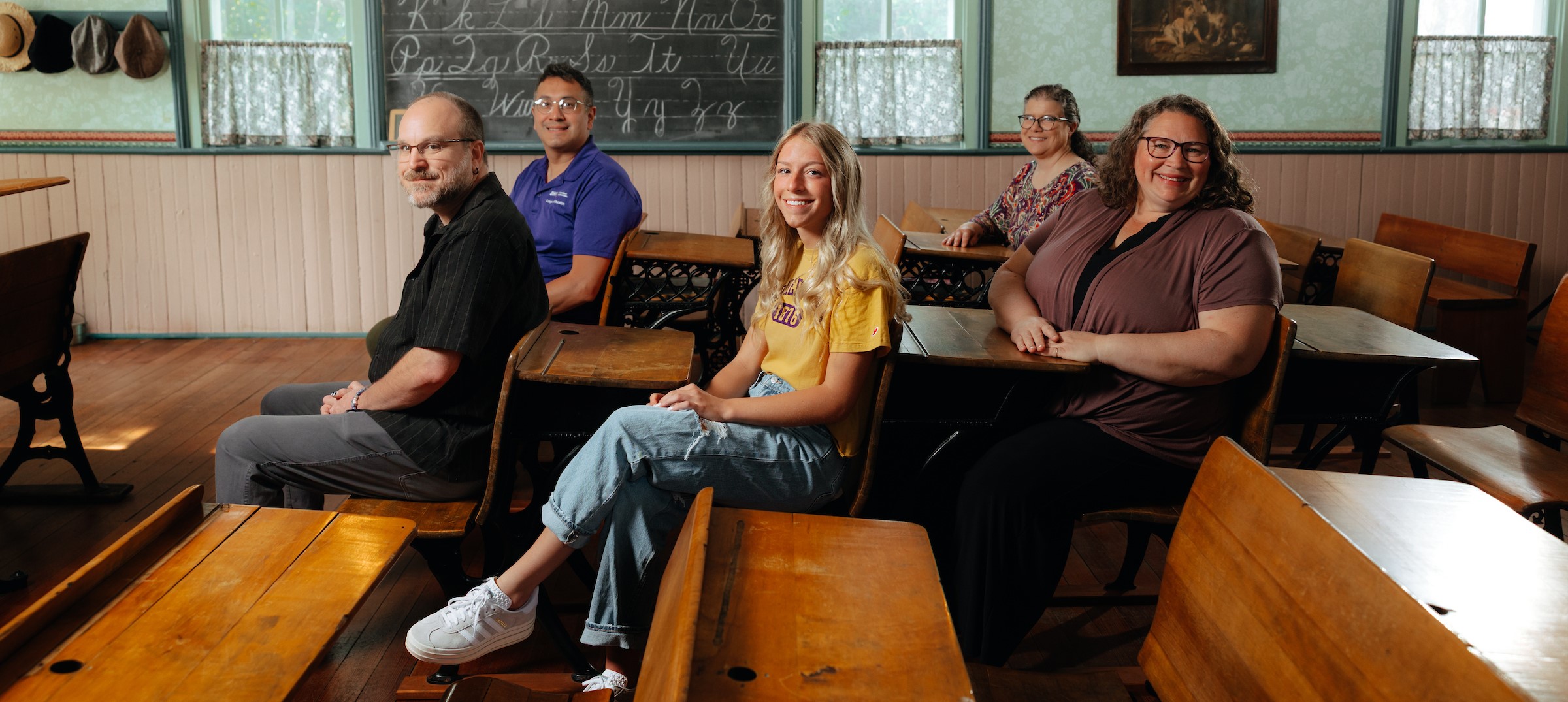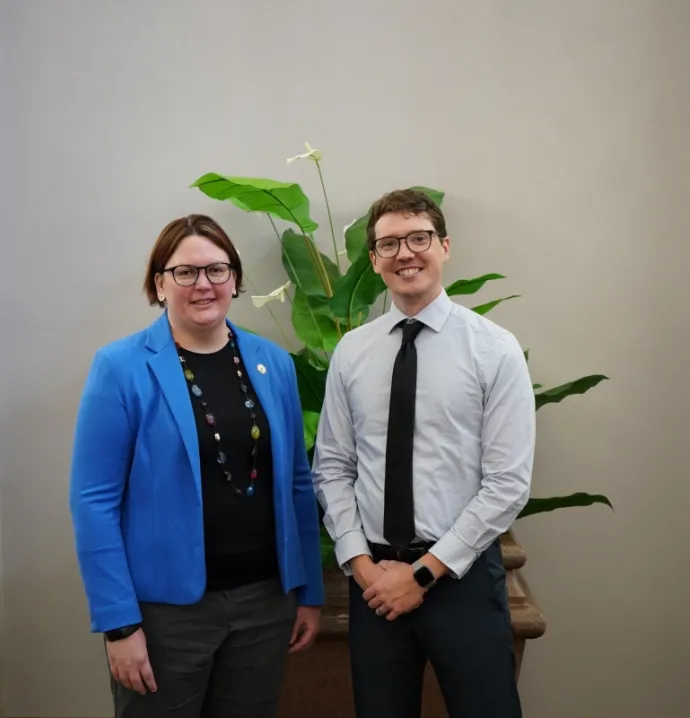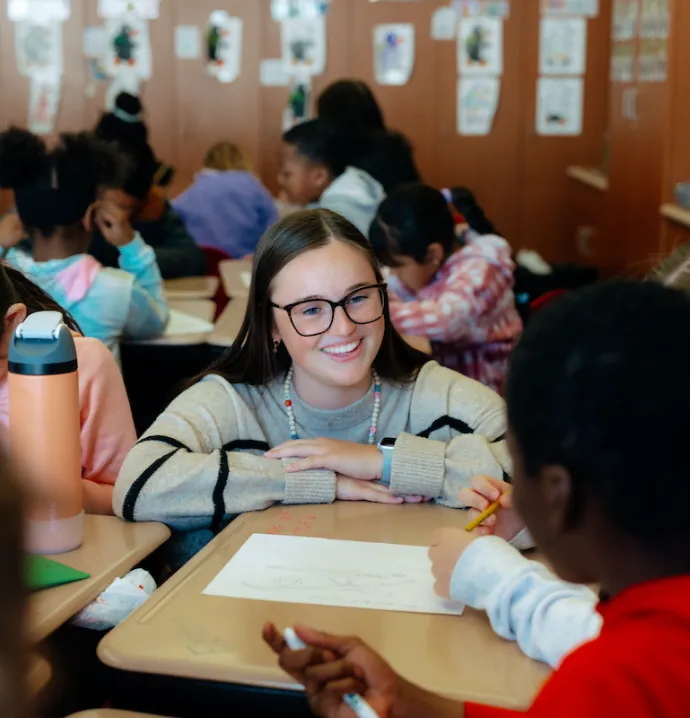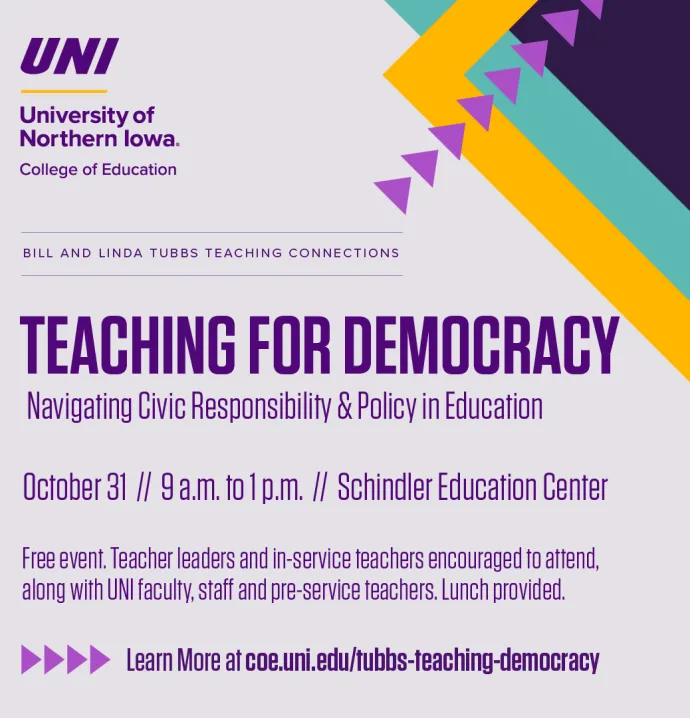Transforming Teacher Education
Transforming Teacher Education

Incoming freshman Lucy Varney joined hundreds of students this fall, embarking on a journey she’s long dreamed of: becoming a Panther-prepared teacher.
At the University of Northern Iowa, expectations are high. She’s joining the largest teacher education program in Iowa, dating back to UNI’s origins in 1876. What she’ll experience, though, will be different. And better.
The Dike-New Hartford graduate is part of an incoming class whose members are the first to benefit from a transformed, ready-for-tomorrow teacher preparation experience. Fall semester marked the implementation of a thoughtfully redesigned curriculum – the most comprehensive update in 20 years. For more than 200 UNI Teacher Education faculty, administrators and staff, it’s the culmination of a collaborative focus for change.
For Varney and her peers, this significant update offers the potential for more timely completion of degrees across the spectrum of teaching majors, enhanced relevance and a refined experience to better position future teachers for continued success.
Three key updates
Driven by a 2022 charge from Provost José Herrera, academic deans and the Teacher Education Executive Council, the revitalized curriculum is grounded by the four components of the Educator Preparation Program’s conceptual framework: professional coursework, content, methods and clinical experience. Today’s curriculum is now more consistent across all majors and offers a flexibility and adaptability that benefits both students and faculty. Key updates include:
- The pairing of required methods courses with a new clinical internship model
- An overhaul of the common core of courses, now known as Educator Essentials
- A more balanced emphasis on both content and methods coursework
“This effort represents the best of what collaboration can achieve — real, lasting change for teacher preparation at UNI,” says Colleen Mulholland, dean of the College of Education and co-chair of the steering committee that coordinated the intensive effort. “Together, we’re cementing our legacy of excellence in teacher education.
Undergraduate Teaching Majors*
UNI students are teaching majors
UNI undergraduates is an elementary education major
Expanding an essential foundation
A need for a more flexible framework drove the effort to revitalize the professional coursework for UNI Teacher Education.
For years, seven courses served as the professional core sequence required of all teacher education students. With the introduction of Educator Essentials — the new name for these foundational courses — students now have 26 topics to choose from within six categories, such as “social context of learning,” “effective pedagogy” and “the professional educator.”
One three-credit class is required per category. The selections — now taught by a broad array of faculty from across all colleges — providea foundation with general and specialized areas of focus.
“Our students gain by having more options based on schedules and needs — and it helps keep them on track and moving toward their degree,” says Benjamin Forsyth, College of Education associate dean of undergraduate studies and teacher education. “As for faculty, more departments will be teaching these courses and faculty can lean into their areas of expertise instead of teaching the same standard course each semester.”
Students, particularly secondary education majors, will also find greater balance and consistency among majors in requirements between the subject coursework – such as math, science, music – and the methods of teaching courses.
In all aspects of the curriculum, there is specific alignment with UNI’s Teacher Education Conceptual Framework, the Iowa Board of Educational Examiners rules and the Interstate Teacher Assessment and Support Consortium (InTASC) Standards. Each conceptual anchor now has student learning outcomes (SLO) identified and tied to these standards and rules.
“As the educational context shifts, SLO assessment is going to allow us to add new components and/or courses to meet the needs of our education students,” says Sarah Vander Zanden, head, Literacy, Early Childhood and Special Education. Overall, she adds, “We can be innovative and flexible with the framework put forward. This allows for change and that is responsive education.”
20 Minors
1 Certificate
Elementary education (1,003)
Social studies & history (188)
Music education (145)
Physical education (126)
English teaching (105)
Art education (99)
*Fall 2024
Faculty and staff
Across five colleges (including online education)
A new model for clinical experience
With curricular approval last fall, the focus turned toward the intricacies of implementation, particularly the new approach to clinical experiences and the linked methods courses.
Many alumni are familiar with the four prior levels of field experience — Levels 1-4, including student teaching. The new model is partly a response to a growing trend: many first-year and transfer students enter UNI having already met the requirements for an initial 10 hours of observation in a classroom.
The faculty also saw benefits to integrating classroom experience with methods courses during the same semester, bridging theory with practice in real time.
A new three-step model emerged:
- Clinical Internship 1, a beginning internship paired with a methods course
- Clinical Internship 2, an advanced internship, with a similar pairing
- Student teaching
An elective course remains available for those who need those initial hours of experience.
“Pairing methods courses with internships allows students to learn while doing, with real-time feedback from experts,” says Forsyth. “We purposefully chose this approach and believe this only strengthens the depth of field experience for which UNI is well known.”
An added benefit: internships now carry three credit hours instead of one — better reflecting student time and effort and building in flexibility for faculty as well.
In the previous model, I had limited time to proactively teach and had an overreliance on sidebar conversations, debriefing in classrooms and online feedback to make up the difference,” says Becky Wilson Hawbaker, who coordinates internship experiences as part of her role. “When I sat down to map out how much more time I will have for the Internship 1 seminar, supervision in classrooms and support of the methods course, it felt like a synergistic miracle,” she continues.
As implementation drew closer, teams of faculty representing the internship and methods part of the collaboration began connecting. Megan Balong, clinical associate professor, and Elizabeth Hughes, math education professor and current educator preparation program faculty chair, piloted paired coursework in the spring semester. “Their structures and experiences helped inform other teams as they prepared for fall,” Hawbaker says.
In May, about 35 UNI faculty and staff gathered for the first of two retreats to finalize alignment among teams of faculty who view their roles as co-teaching in the new model. In addition to reviewing various processes and tools, they worked together to create a consistent framework across syllabi, policies, assessments and assignments.
Hawbaker was among the attendees, working with Wendy Miller, professor of art education and her methods partner for internship experiences she coordinates. “Teaching is so much more fun as a team!” Hawbaker says.
“I will be able to co-teach with Becky and be more directly involved in the internship experience,” Miller notes. “I also revised my methods course to align with new student learning outcomes, a few that I previously did not teach. That is exciting as I will have fresh new materials in my courses. Change is hard, but learning new ideas is exciting!”
“Now students are not just ‘completing hours,’ but are gaining vital experience in applying what they have learned in methods,” says Mandie Sanderman, College of Education assistant dean of assessment and clinical experiences during the ramp up to implementation. “They are then able to debrief with their classmates and professors regarding their experience, allowing for greater reflection and growth.”
As these final touches were being planned, professional and faculty advisors worked with current students in the spring to update plans of study. This led to questions, like: “Will this add more? How is this better?”
“When students realized it’s a change, but not drastic in terms of combinations of classes, length of time or a load, they were relieved and pumped,” says Jenny Connolly, College of Education director of advising.

I also revised my methods course to align with new student learning outcomes (SLOs), a few that I previously did not teach. That is exciting as I will have fresh new materials in my courses. Change is hard, but learning new ideas is exciting!
An unwavering commitment
 The re-energized curriculum reflects a myriad of refinements and adjustments, large and small, meant to secure a legacy and enrich the experience of today’s students. Through it all, a sincere adherence to a mantra of “accessibility, flexibility and adaptability” kept the focus on an outcome meant to benefit all — faculty and staff behind the program, future students, future teachers, future employers and the communities served.
The re-energized curriculum reflects a myriad of refinements and adjustments, large and small, meant to secure a legacy and enrich the experience of today’s students. Through it all, a sincere adherence to a mantra of “accessibility, flexibility and adaptability” kept the focus on an outcome meant to benefit all — faculty and staff behind the program, future students, future teachers, future employers and the communities served.
Forsyth says the process has led to stronger interactions and communications among faculty, advisors across campus, on-campus partners like admissions and the registrar’s office as well as PK-12 and community college partners off campus. “Staying actively up-to-date with each of these groups remains a major priority,” says Forsyth.
“The changes represent an exciting modernization of our preparation of Iowa’s teachers at UNI,” says Jennifer McNabb, professor of math education. “The curricular processes involved the energies and input of faculty across campus and represent the partnerships and collaboration that exemplify UNI’s student centered approach to program design.”
She adds: “Our work was inspired in part by conversations with our alumni who have related their experiences in Iowa’s classrooms. I think they will find these changes capable of producing welltrained and job-ready future colleagues.”
“We want great teachers to join great teachers in the field,” says Vander Zanden, citing UNI Teacher Education alumni. “Some of the names of things have changed, but the ongoing commitment to quality and the focus on both theory and practice is unwavering.”
Strengthening school partnerships
The introduction of an updated curriculum for UNI Teacher Education served as a springboard for deeper dialogue with local school districts — critical partners in professional education.
With the launch of a new internship model, the College of Education — which manages clinical placement agreements — saw an opportunity for greater engagement, balance and collaboration with districts in and around the Cedar Valley. This led to two workshops and face-to-face meetings this past spring with superintendents, principals, curriculum coordinators and mentor teachers from 15 districts. College faculty and staff reviewed the upcoming curricular changes and the new approach to placements. They also welcomed input on how clinical experiences could better mutually benefit everyone involved.
Improving partnerships & placements
At an April workshop, Becky Wilson Hawbaker, head, Department of Educational Foundations and Professional Experiences, outlined goals to improve partnerships and the placement experience:
- Provide support to mentor teachers in ways that lighten their loads
- Offer leadership, reflection and professional learning for mentor teachers
- Support student interns academically, behaviorally and emotionally
- Enhance learning for all students
- Bring fresh ideas and resources to the classroom
- Align pedagogy, curriculum and management strategies
“These efforts benefit both our school partners and our students. We want to support our partners while giving our students a professional education that should result in strong new teachers ready for success and prepared to become valuable colleagues once hired,” Hawbaker says.

Flexibility in learning
Increased credit hours for the internship course create flexibility for additional learning through activities and more support for mentor teachers and schools. UNI students might help plan a family literacy night, support 1:1 tutoring — or even take a lunch duty shift.
“Who wouldn’t benefit from adult volunteers helping around the school?” asks Hawbaker. “These real-world experiences not only support schools, but also deepen our students’ understanding of teaching, benefiting UNI Teacher Education as well.”
Attendees also discussed alternative models, such as more embedded placements, like the professional development school model used with several Waterloo elementary schools. Interns might gain broader experience through instructional rounds or interactions with other classrooms, support services or special programs. Other topics included the selection and orientation of mentor teachers and balancing placements across districts, including internships and student teaching, particularly in local rural districts.
Though still early, the renewed dialogue signals promising new directions for UNI Teacher Education. Partner feedback reinforced the shared interest in purposeful partnerships, greater support and communications for teachers who mentor, and quality experiences that reflect the best teaching practices.
Justin Stockdale (‘98, BA; ‘01, MAE), superintendent of Dike-New Hartford Community School District, appreciated the outreach, especially as a rural district.
“I really like the concept of getting students real-world, organic experiences and the changes will do just that,” Stockdale says. “Our school district has opened its doors for years and supports field experience and those needing a student teaching placement. Being invited to the table validated all the hard work that’s gone into supporting those students.”

These real-world experiences not only support schools, but also deepen our students' understanding of teaching, benefiting UNI Teacher Education as well.
State approval extends Educator Preparation Program accreditation
A nearly two-year process culminated in May with UNI’s Educator Preparation Program (EPP) receiving unanimous approval by the Iowa State Board of Education for full re-accreditation.
The state’s largest EPP coordinates the preparation of more than 2,250 undergraduate and graduate students in more than 20 undergraduate teaching majors and six graduate degrees leading to Iowa licensure.
“To be re-accredited recognizes the quality of a program that has served as the foundation for UNI from its origins nearly 150 years ago,” says José Herrera, provost and executive vice president. “As a program, we’re in great shape to continue to help meet the workforce needs of Iowa in all the key professions this program supports.”
The curricular update helped meet expectations for reaccreditation, says College of Education Dean Colleen Mulholland. “Driven by our approach to the updated curriculum, its implementation has naturally led to process, structural and communication adjustments which better position us to support students, faculty and partners in PK-12 education.”
The accreditation covers five academic areas of study: undergraduate teaching, administration, school counseling, school psychology and speech-language pathology. The next state review occurs in the 2030- 2031 academic year.
Clinical Experiences (All placements)
2,434 field experiences (previous levels 1, 2, 3)*
949 student placements for 525 student teachers*
*Clinical Experiences 2024-25
Classes with clinical experience
Before student teaching
with Transformation:
95 new or revised courses
34 program revisions
Moving from 7 core courses to 26 Educator Essentials




